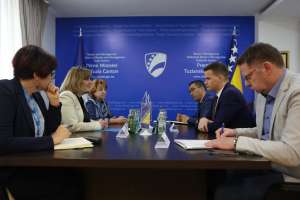SARAJEVO, June 21 (FENA) - World Refugee Day is an international day designated by the United Nations to honor refugees around the globe. World Refugee Day is marked on June 20 and is an occasion to build empathy and understanding for their plight and to recognize their resilience in rebuilding their lives. The task of the UN High Commissioner for Refugees is to help them and point out the challenges they are facing.
“It has been 20 years since the United Nations designated June 20 as a day to remember the fact that millions of people and families have been forced to flee their homes due to war, violence or persecution, but also a day to pay tribute to their strength, resilience, and courage. Two decades ago, the number of refugees and internally displaced persons seemed to be declining. Today the situation is reversed. By the end of 2019, almost 80 million people had been displaced from their homes,” UNHCR Representative in Bosnia and Herzegovina Lucie Gagne said in an interview with FENA.
She emphasizes that the number of conflicts around the world is only increasing. UNHCR estimates that one in 100 people in the world has left their home.
“In other words, if all displaced people in the world lived in one country, that country would be the twentieth most populous on our planet! We are marking this year’s World Refugee Day against a backdrop of a dramatic global crisis. Not only are record numbers of people forced to flee their homes, but the world is grappling with COVID-19, a disease that is still very much affecting us all. Given this gloomy background, I think we will all agree that much more needs to be done to find homes and provide a better future for people displaced due to war, conflict, and persecution. The motto of this year's "World Refugee Day" is "Everyone can make a difference. Every action counts." And all those who contribute to helping refugees, internally displaced persons and asylum seekers - governments, civil society, the media, but also "ordinary" people - have certainly made and still make a difference,” Gagne added.
Answering the question about challenges that refugees as a vulnerable category of people are facing in the background of coronavirus pandemic, Gagne says that the COVID-19 pandemic made the whole world feel vulnerable and many things that defined our daily lives changed overnight.
She noted that asylum seekers and refugees are particularly vulnerable to racist and xenophobic attitudes and that UNHCR and its partners are actively involved in combating the problem at all levels.
As elsewhere in Europe, UNHCR, she adds, is taking steps to help respond to the challenges that the public health is facing due to the COVID-19 pandemic, and to prevent further spread in Bosnia and Herzegovina.
“UN team in BiH cooperates with authorities at all levels, trying to ensure that refugees and asylum seekers are included in national health plans to combat the pandemic and to be well informed on how to prevent the spread of COVID-19, to have access to soap and clean water and to continue to receive the help they need. The emergence of COVID-19 in the Western Balkans has created several unique challenges for migrants, asylum seekers, and refugees in the region. Thanks to generous funding from the EU-funded project "Instrument contributing to Stability and Peace" UNHCR and IOM will seek to alleviate some of these problems through a 15-month regional, eight million worth joint project “Identifying and Addressing COVID-19 related challenges within migrant and refugee responses in the Western Balkans". The project aims to protect migrants, asylum seekers, refugees, and other vulnerable people, by ensuring that appropriate systems and services are in place, which are strengthened and can be quickly adapted to measures that must be implemented in response to the COVID-19 epidemic,” Gagne said.
She points out that over the last three months, measures introduced to prevent the spread of COVID-19 have affected asylum seekers and migrants as much as BiH citizens.
Refugees and asylum seekers are also part of mixed movements, a situation entering its third year in Bosnia and Herzegovina.
Asked what are the key challenges that BiH authorities are facing and how UNHCR is helping, she said that UNHCR, especially with the support of the EU and other donors such as the US, is helping BiH authorities manage the Asylum Center Delijaš and Center for the reception of refugees in Salakovac, as well as strengthening the capacity of the asylum system in the country.
“Our staff is engaged in temporary reception centers with the main task to identify and assist those who need international protection and who want to seek asylum in Bosnia and Herzegovina. UNHCR in partnership with other stakeholders such as the Ministry of Human Rights and Refugees, the Ministry of Security, UN sister organizations: IOM, UNICEF, UNFPA, and other international organizations such as the Danish Refugee Council, Save the Children assist in finding solutions for vulnerable categories such as unaccompanied children. Although current needs for safe and dignified shelter exceed capacity in some areas of the country, the main concern at the moment is the lack of safe and adequate shelter for unaccompanied children or children separated from primary caregivers. It is very important that these children are protected from the risk of irregular movements and dangers such as smuggling and human trafficking while providing other forms of assistance that they desperately need. They should also have access to all aspects of the asylum system in BiH. It is vital that particularly vulnerable groups among refugees, migrants, and asylum seekers - unaccompanied children and children separated from primary caregivers, pregnant women, single parents, people with disabilities, the elderly, girls and boys, people with significant medical needs, the sick and families with children - quickly identify and instruct the authorities so that they can get the help and services they desperately need. It is also crucial that they are given access to relevant procedures in accordance with international standards and national regulations,” she added.
In the context of activities aimed at closing the chapter on displacement under Annex VII of the Dayton Peace Agreement, UNHCR has been and remains an important and proud partner to unexpectedly successful Regional Housing Program (RSP).
Bosnia and Herzegovina is a signatory to the 1951 Refugee Convention. Speaking about how the principles from this Convention are incorporated into domestic legislation and how they are applied in practice in BiH, the UNHCR representative says that the BiH legislation on asylum is harmonized with European and international standards. UNHCR has good working relations with the relevant authorities, in particular the Asylum Sector, the Ministry of Security and the Service for Foreigners’ Affairs, as well as with the Ministry of Human Rights and Refugees.
“With the growing influx of migrants in Bosnia and Herzegovina, the asylum system in the country to provide an adequate response has been called into question due to lack of resources. UNHCR is assisting the authorities, but more is needed to strengthen the capacity of the BiH Ministry of Security's Asylum Sector to properly assess each asylum application and to expand the Sector's reach by bringing the system closer to people in need. Currently, 425 asylum seekers in BiH are waiting for their asylum application to be resolved, of which 2/3 are families with children, 22 are unaccompanied children and 11 are single women. It is important to note the fact that there are several hundred more who have requested that their asylum application be registered, but due to a combination of lack of resources, preventive measures due to COVID-19, geographical difficulties and political will, they have failed to do so and are currently in legal limbo, which deepens their vulnerability and risk exposure. Most of them are in the Una-Sana Canton. We are working together with the Asylum Sector to find a solution to their situation. In addition, assisted integration programs that take into account the individual needs of refugees or persons under subsidiary protection are urgently needed,” UNHCR Representative in BiH Lucie Gagne concluded in an interview with FENA.
(FENA) A. B.










